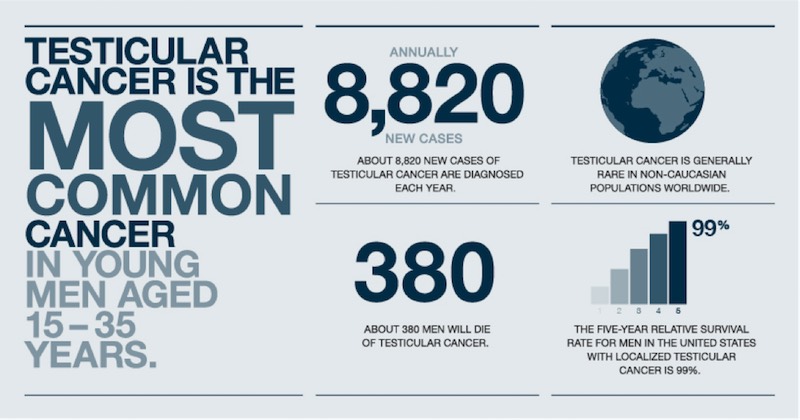5 Early Signs Of Testicular Cancer That Men Must Not Ignore
Last updated on
This is a sensitive topic that most people don’t want to talk about. But, I do discuss this sometimes with my men clients in my personal health coaching service. In all seriousness, an estimated 8,820 men in the United States will be diagnosed with testicular cancer this year. The average age of diagnosis is 33.
I know it’s a topic most men are too embarrassed to talk about, but it’s more common than you think. You should be aware of its sneaky symptoms. The first sign of testicular cancer is a change in the size or shape of one or both testicles. Often this change doesn’t cause pain, though pain may be present.
Most doctors recommend that men ages 15-40 regularly give themselves a self examination. This will lead to early detection and is especially important for those who have a history of un-descended testicles or familial history of testicular cancer.
Testicular Cancer Self Exam: Hold your penis out of the way and check one testicle at a time. Hold the testicle between your thumbs and fingers of both hands and roll it gently between your fingers. Look and feel for any hard lumps or smooth rounded bumps or any change in the size, shape, or consistency of your testicles.
Early Signs Of Testicular Cancer
- A swelling and/or lump in one or both of the testicles. You may or may not have pain in the testes or scrotum.
- A heavy feeling in the scrotum.
- A dull pain or feeling of pressure in the lower belly or groin.
- Breast growth or soreness: In rare cases, germ cell tumors can make breasts grow or become sore. Some cell tumors can make estrogen, which can cause breast growth or loss of sexual desire.
- Early puberty in boys: Some cell tumors can make androgens (male sex hormones). Androgen-producing tumors may not cause any specific symptoms in men, but in boys they can cause signs of puberty at an abnormally early age, such as a deepening voice and growth of facial and body hair.
Keep in mind: It could be perfectly normal for one testicle to be slightly larger than the other, and for one to hang lower than the other.
Symptoms Of Advanced Testicular Cancer
Advanced testicular cancer is determined when the cancer has spread beyond the testicles, and regional lymph nodes, to other organs. The symptoms can vary, based on the region it spreads to. Symptoms of late-stage testicular cancer may include:
- Dull pain in the lower back and belly: From cancer spreading to the lymph nodes in the back of the belly.
- Lack of energy, sweating for no clear reason, fever, or a general feeling of illness.
- Shortness of breath, coughing, or chest pain: Even coughing up blood may develop from cancer spreading in the lungs.
- Headache or confusion: From cancer spreading to the brain.
- Belly Pain: Either from enlarged lymph nodes, or because the cancer has spread to the liver.
Keep in Mind: A number of non-cancerous conditions, such as testicle injury or inflammation, can cause symptoms similar to those of testicular cancer. Inflammation of the testicle (orchitis) and inflammation of the epididymis (epididymitis) can cause swelling and pain of the testicle. Both of these also can be caused by viral or bacterial infections.
Testicular Exams And Tests
- Testicular Ultrasound: This test may be used to rule out other possible causes of an enlarged, or painful testicle before the testicle is removed.
- Blood Tests: These are often done to measure the levels of the tumor markers in your blood:
- Alpha Fetoprotein (AFP)
- Beta Human Chorionic gonadotrophin (beta-hCG)
- Lactate Dehydrogenase (LDH)
- Imaging tests: Such as Chest-X-ray, and CT scan of the chest, abdomen, and pelvis.
Don’t panic. Testicular cancer is one of the most curable forms of cancer, especially during its early stages. So, start giving yourself a self-examination once a month. If you feel like there is something unusual going on down there, go ahead and get checked by your professional healthcare provider.
Keep in mind that it could be nothing, but it is always better to be safe than late.
References:
https://www.cancer.org/cancer/testicularcancer/moreinformation/doihavetesticularcancer/do-i-have-testicular-cancer-self-exam
https://www.webmd.com/cancer/tc/testicular-cancer-symptoms
https://www.cancer.org/cancer/testicularcancer/detailedguide/testicular-cancer-signs-and-symptoms
Some of the links I post on this site are affiliate links. If you go through them to make a purchase, I will earn a small commission (at no additional cost to you). However, note that I’m recommending these products because of their quality and that I have good experience using them, not because of the commission to be made.



































 JOIN OVER
JOIN OVER
Comments